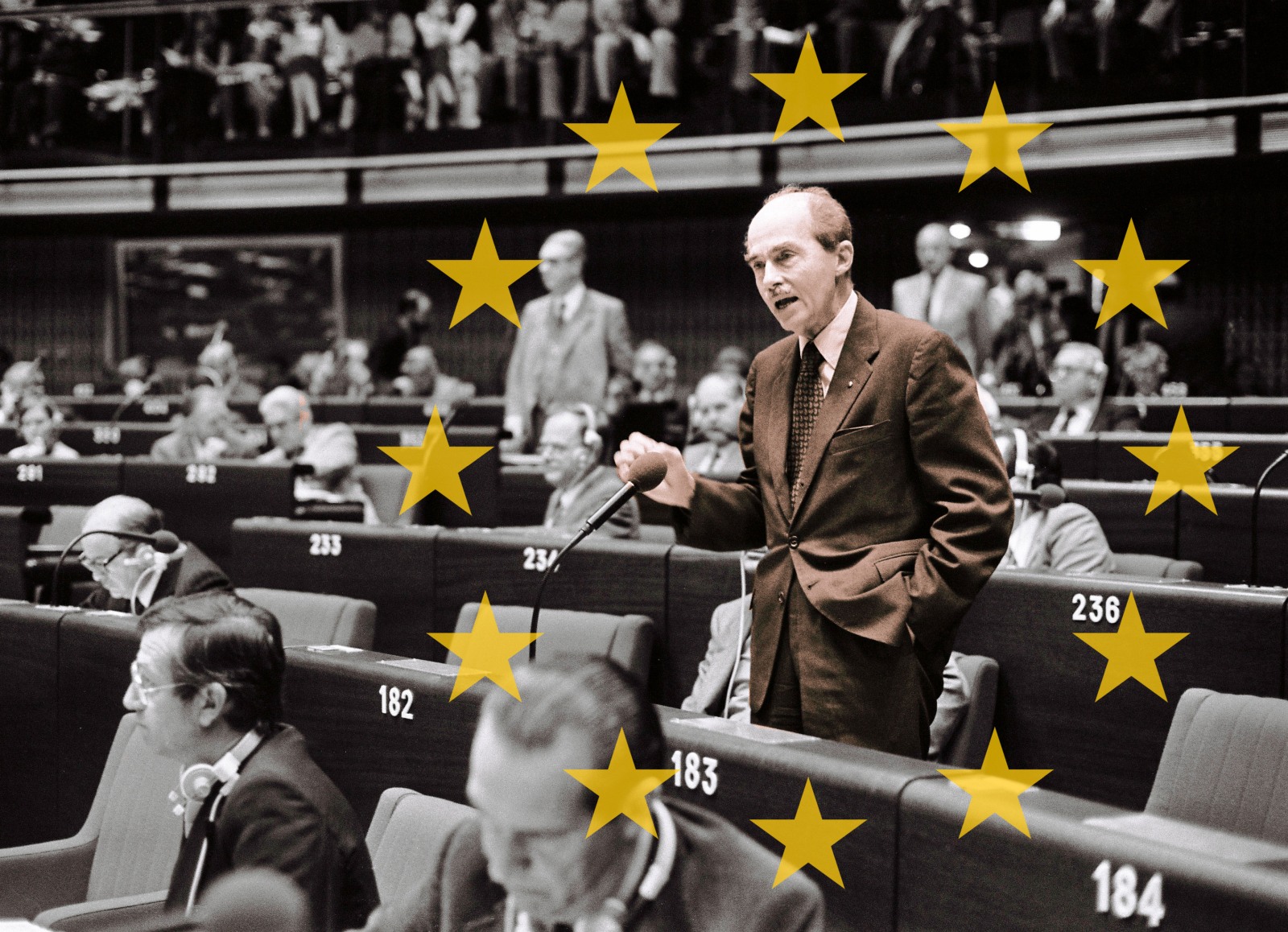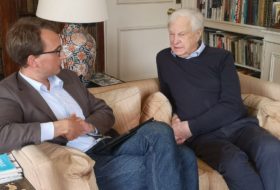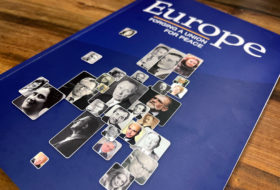For twenty years, the former heir to the throne worked with great dedication for the unity of the Old Continent, for democratic values and for reinforcing Europe’s influence in world politics. With his outstanding diplomatic sense and dedication, he had a major influence on European politics, in particular in preparing the integration of the Central European countries.
“At least here you have the feeling that you are serving a useful cause.”
Otto von Habsburg ended his letter to Friedrich August von Hayek, who was by then a Nobel Prize winner in economics, with this sentence at the end of October 1979. In it, he informed his friend that he would continue his public activities as a member of the European Parliament from the summer of that year. The short sentence makes it clear that the former Crown Prince had high hopes that the assembly, which from then on would be directly elected, could shape the fate of the continent.
The early summer of 1979 was indeed a milestone in the history of European integration. Although the European Economic Community (EEC) had gained considerable economic and political importance over the years, it was criticised for the democratic deficit of its institutions. A number of concepts and strategies to remedy this – in particular to reform the role of the Parliament and the way it was elected – had been drawn up since the late 1950s, but conflicts of interest between the European institutions had long prevented their implementation. These conflicts were finally resolved by separating, at least temporarily, the issue of the election of the Parliament from the question of the extension of institutional powers. The first direct elections, originally scheduled for autumn 1978, took place almost a year later, in June 1979, when the citizens of the EEC, which at the beginning of the decade had integrated nine member states, including Britain, Ireland and Denmark, were able to decide for the first time who would make up the 410-member body. In order to increase democratic legitimacy, not only the political elite but also representatives of civil society – churches, trade unions and various social initiatives – did much to mobilise voters and create a kind of European demos: popular politicians ‘toured’ neighbouring countries, European festivals and concerts sought to reinforce the idea of an imaginary European community. In the elections, held between 7 and 10 June, 62% of the 184.5 million citizens eligible to vote participated.
The inaugural session of the new European Parliament was held a few weeks later in Strasbourg, where MEPs elected Simone Veil of France as President. Veil was in many ways a symbolic figure. She had survived Nazi concentration camps, was a women’s rights activist after the war, was committed to Franco-German reconciliation and had a strong commitment to the success and further enlargement of European integration. Twice re-elected Simone Veil and Otto von Habsburg were fellow MEPs until 1993.
For our namesake, winning a seat in the European Parliament was not a self-evident possibility, especially as he was not a citizen of an EEC member state until 1978. Eventually, he was able to stand for election in the Federal Republic of Germany, within the district of his residence in Pöcking, holding the Staatsbürgerschaft. This resulted in him being elected to the European Parliament in third place on the list of the Christian Social Union in Bavaria (CSU), which won eight seats in the 1979 elections. His candidacy – although the idea, according to a CSU legend, had come from the party’s grey eminence, Heinrich Aigner – was a conscious decision by Franz Josef Strauß. The politician, who had become minister-president of the state of Bavaria after serving as a minister in Bonn, knew that the leading party of the state, which, thanks to the industrial modernisation of the 1960s and 1970s, had been emerging as an increasingly important federal and international political actor, could only maintain its prominent position if it not only kept pace with the changes in the socio-economic structure of the time, but also if its political ambitions and horizons were able to extend beyond the confines of local public life. Otto von Habsburg proved to be the perfect choice to achieve this latter goal, as his exceptional international outlook and unparalleled political and diplomatic experience enabled him to effectively represent Bavaria’s interests beyond the borders of the region, and his unique charisma made him one of the most popular European politicians in his party.
The particular ‘cosmopolitanism’ of Otto von Habsburg was, however, very different from the obscure internationalism of the Social Democrats – and of their list leader, former Federal Chancellor Willy Brandt – who had built their campaign on the discrediting of the former Crown Prince. His realism and pragmatism, subtly interwoven with moralistic considerations, remaining loyal to traditional Christian values and rejecting all forms of political extremism, while supporting further deepening and widening of European integration, resonated well with the preferences of the Bavarian electorate. A proven master of democratic politics down the years, the former Archduke had already demonstrated in his first campaign that tradition and modern public engagement were not only compatible, but that his historical and dynastic experience and awareness were a resource that could serve the development of the region, the country and the continent.
Some of the documents on Otto von Habsburg’s activities in the European Parliament are kept by our Foundation. The proper interpretation and processing of these sources is greatly aided by the recollections of his former direct associates. We also have excellent relations with several of Otto von Habsburg’s former assistants, many of whom have donated relics of the European election campaigns to us. Recently, Knut Abraham – a current Member of the Bundestag (CDU), who had worked with our namesake between 1987 and 1996, from 1994 onwards in Brussels – sent our Foundation a recording of Otto’s election speech in March 1979, as well as some posters and other publicity material. Our growing collection of objects and the ongoing processing of archival sources enable us to portray as accurately as possible the political profile of the former heir to the throne who became MEP.
From the documents in our Foundation’s archives, emerges the image of a man who sought consensus, engaged in dialogue with his political opponents, but always remained true to his principles. Otto von Habsburg entered European politics at the time of the so-called Eurosclerosis, and worked to promote a united, Christian and social Europe during the period of regime change, the 1990s and during the euphoric era of the Maastricht Treaty.
Among his many speeches, proposals and resolutions, the best known and most characteristic are those relating to the dismantling of the Iron Curtain, the situation and political transformation of Central and Eastern Europe, including the dissolution of the Soviet Union and Yugoslavia, the unification of the two German states, and in particular the enlargement of the European Union to the East. However, his support was far from being confined to the countries of Central and Eastern Europe: he strongly stood by the enlargement rounds of 1981 (Greece), 1986 (Portugal, Spain) and 1995 (Austria, Finland, Sweden), arguing that the accession of each new member state would further stimulate and strengthen the European project.
However, his scope of interest was even broader than that, focusing on many other areas in addition to enlargement. His work was particularly significant in promoting the cause of European security and the creation of common European institutions, but he was also deeply involved in economic (world economic trends and development policy, extending the concept of the social market economy beyond Germany), social (the transformation of stratification and class structures, the situation of developing countries) and environmental (climate change, animal welfare) issues.
Although our namesake was not one of the ‘founding fathers’ and did not hold a leading European political position, he played a prominent role in the history of integration through his two decade-long parliamentary career. Around the time of the regime change, Otto von Habsburg, interviewed by Chatham House magazine, confessed with deep conviction:
“I thank God that I get to be a member of the European Parliament.”
His words truly reflect his commitment and passion for a united and democratic Europe, and his parliamentary activities continue to inspire political thinking and practice both domestically and in Europe.
To mark the anniversary, our Foundation is commemorating the commited service and legacy of its namesake in Europe through a series of professional and public events at home and abroad.
Bence Kocsev
Gergely Fejérdy


